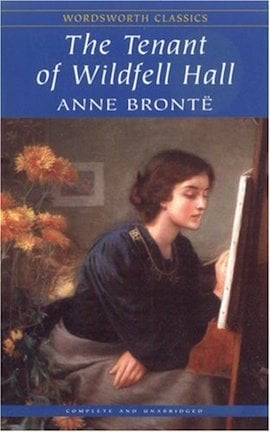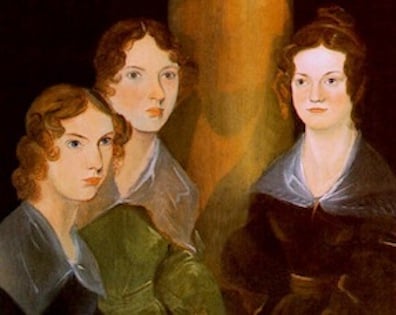The Tenant of Wildfell Hall by Anne Brontë: A 19th-Century Introduction
By Mary Ward | On February 23, 2018 | Updated August 24, 2020 | Comments (0)

The introduction to The Tenant of Wildfell Hall (1848) by Anne Brontë is excerpted from Life and Works of the Sisters Brontë by Mary A. Ward, a 19th-century British novelist and literary critic. It’s not so much an analysis, but rather, places the novel in the context of Anne’s life.
The Tenant of Wildfell Hall, first published under Anne’s pseudonym Acton Bell, was an immediate success. It was considered shocking for its time, and in retrospect, it’s considered one of the earliest feminist novels.
When the novel was first published, reviews on both sides of the Atlantic identified it as the work of Currer Bell (Charlotte Brontë‘s pseudonym), author of Jane Eyre, or Ellis Bell (actually Emily Brontë), author of Wuthering Heights, or both. It was common for the three sisters to be mistaken for one writer, which was quite vexing to them.
Most of the public and critics believed at first that the writer or writers of these books were men. That wasn’t at all disconcerting to the sisters, since it was their intention to conceal their identities.
Anne only lived to the year following the publication of The Tenant of Wildfell Hall. She died of tuberculosis at the age of twenty-nine in 1849.
Charlotte prevented the republication of The Tenant of Wildfell Hall after Anne’s death, nearly causing its oblivion in literary history. Why she did so is somewhat unclear, and altogether disturbing.
. . . . . . . . . .

An 1848 Review of The Tenant of Wildfell Hall
. . . . . . . . . .
The novel tells the story of the mysterious Helen Graham, who arrives at Wildfell Hall with her young son and servant. Through a series of letters from another character, we learn of Helen’s troubled past.
The following excerpt is abbreviated from Ward’s 1899 book about the Brontë sisters. These passages don’t so much summarize or analyze the book but put Anne in the context of her family and the times in which she lived. It also discusses the effect that the troubling Brontë brother, Branwell, might have had on the sisters’ work:
The Tenant of Wildfell Hall — an introduction by Mary A. Ward
Anne Brontë serves a twofold purpose in the study of what the Brontës wrote and were. In the first place, her gentle and delicate presence, her sad, short story, her hard life and early death, enter deeply into the poetry and tragedy that have always been entwined with the memory of the Brontës, as women and as writers; in the second, the books and poems that she wrote serve as matter of comparison by which to test the greatness of her two sisters.
She is the measure of their genius — like them, yet not with them.
. . . . . . . . . . .

RELATED CONTENT
The Brontë Sisters’ Path to Publication
Without the Veil Between (a novel about Anne Brontë)
. . . . . . . . . . .
A wrong impression of Anne
Many years after Anne’s death her brother-in-law protested against a supposed portrait of her, as giving a totally wrong impression of the ‘dear, gentle Anne Brontë.” “Dear” and “gentle” indeed she seems to have been through life, the youngest and prettiest of the sisters, with a delicate complexion, a slender neck, and small, pleasant features.
Notwithstanding, she possessed in full the Brontë seriousness, the Brontë strength of will. When her father asked her at four years old what a little child like her wanted most, the tiny creature replied — if it were not a Brontë it would be incredible!— “Age and experience.”
Branwell’s mark on the sisters’ work
Much of Emily Brontë’s Wuthering Heights and all of Anne’s The Tenant of Wildfell Hall show Branwell’s mark, and there are many passages in Charlotte’s books also where those who know the history of the parsonage can hear the voice of those sharp moral repulsions, those dismal moral questionings, to which Branwell’s misconduct and ruin gave rise.
Their brother’s fate was an element in the genius of Emily and Charlotte which they were strong enough to assimilate, which may have done them some harm, and weakened in them certain delicate or sane perceptions, but was ultimately, by the strange alchemy of talent, far more profitable than hurtful, inasmuch as it troubled the waters of the soul, and brought them near to the more desperate realities of our “frail, fall’n humankind.”
But Anne was not strong enough, her gift was not vigorous enough, to enable her thus to transmute experience and grief. The probability is that when she left Thorpe Green in 1845 she was already suffering from that religious melancholy of which Charlotte discovered such piteous evidence among her papers after death.
It did not much affect the writing of Agnes Grey, which was completed in 1846, and reflected the minor pains and discomforts of her teaching experience, but it combined with the spectacle of Branwell’s increasing moral and physical decay to produce that bitter mandate of conscience under which she wrote The Tenant of Wildfell Hall.
. . . . . . . . . . .
See also: Quotes from Agnes Grey and The Tenant of Wildfell Hall
. . . . . . . . . . .
How gentle Anne could speak unpalatable truths
“Hers was naturally a sensitive, reserved, and dejected nature. She hated her work, but would pursue it. It was written as a warning,” — so said Charlotte when, in the pathetic Preface of 1850, she was endeavoring to explain to the public how a creature so gentle and so good as Acton Bell should have written such a book as The Tenant of Wildfell Hall.
And in the second edition of The Tenant of Wildfell Hall, which appeared in 1848, Anne Brontë herself justified her novel in a Preface. The little Preface is a curious document.
It has the same determined didactic tone which pervades the book itself, the same narrowness of view, and inflation of expression, an inflation which is really due not to any personal egotism in the writer, but rather to that very gentleness and inexperience which must yet nerve itself under the stimulus of religion to its disagreeable and repulsive task.
… But at the same time she cannot promise to limit her ambition to the giving of innocent pleasure, or to the production of a perfect work of art: “Time and talent so spent I should consider wasted and misapplied.” God has given her unpalatable truths to speak, and she must speak them.
The measure of misconstruction and abuse, therefore, which her book brought upon her she bore, says her sister, “as it was her custom to bear whatever was unpleasant, with mild, steady patience. She was a very sincere and practical Christian, but the tinge of religious melancholy communicated a sad shade to her brief, blameless life.”
. . . . . . . . . . .
The Tenant of Wildfell Hall on Amazon*
. . . . . . . . . . .
Nearly as successful as Charlotte’s Jane Eyre
In spite of misconstruction and abuse, however, The Tenant of Wildfell Hall seems to have attained more immediate success than anything else written by the sisters before 1848, except Jane Eyre.
It went into a second edition within a very short time of its publication, and Messrs. Newby informed the American publishers with whom they were negotiating that it was the work of the same hand which had produced Jane Eyre, and superior to either Jane Eyre or Wuthering Heights!
It was, indeed, the sharp practice connected with this astonishing judgment which led to the sisters’ hurried journey to London in 1848 — the famous journey when the two little ladies in black revealed themselves to Mr. Smith, and proved to him that they were not one Currer Bell, but two Miss Brontës.
It was Anne’s sole journey to London—her only contact with a world that was not Haworth, except that supplied by her school-life at Roehead and her two teaching engagements.
And there was and is a considerable narrative ability, a sheer moral energy in The Tenant of Wildfell Hall which would not be enough, indeed, to keep it alive if it were not the work of a Brontë, but still betray its kinship and source.
The scenes of Huntingdon’s wickedness are less interesting but less improbable than the country-house scenes of Jane Eyre; the story of his death has many true and touching passages; the last love-scene is well, even in parts admirably, written.
. . . . . . . . . . .
Watch The Tenant of Wildfell Hall (mini-series) on Amazon*
. . . . . . . . . . .
Bearing the mark of Branwell
But the book’s truth, so far as it is true, is scarcely the truth of imagination; it is rather the truth of a tract or a report. There can be little doubt that many of the pages are close transcripts from Branwell’s conduct and language — so far as Anne’s slighter personality enabled her to render her brother’s temperament, which was more akin to Emily’s than to her own.
The same material might have been used by Emily or Charlotte; Emily, as we know, did make use of it in Wuthering Heights; but only after it had passed through that ineffable transformation, that mysterious, incommunicable heightening which makes and gives rank in literature.
… It is not as the writer of The Tenant of Wildfell Hall but as the sister of Charlotte and Emily Brontë, that Anne Brontë escapes oblivion — as the frail “little one,” upon whom the other two lavished a tender and protecting care, who was a witness of Emily’s death, and herself, within a few minutes of her own farewell to life, bade Charlotte ‘take courage.’
. . . . . . . . . . .
More about The Tenant of Wildfell Hall by Anne Brontë
- Wikipedia
- Reader discussion on Goodreads
- An Entire Mistake: The Suppression of The Tenant of Wildfell Hall
- Review on Smart Bitches Trashy Books
. . . . . . . . . . .
*This post contains Amazon Affiliate links. If the product is purchased by linking through, Literary Ladies Guide receives a modest commission, which helps maintain our site and helps it to continue growing!



Leave a Reply